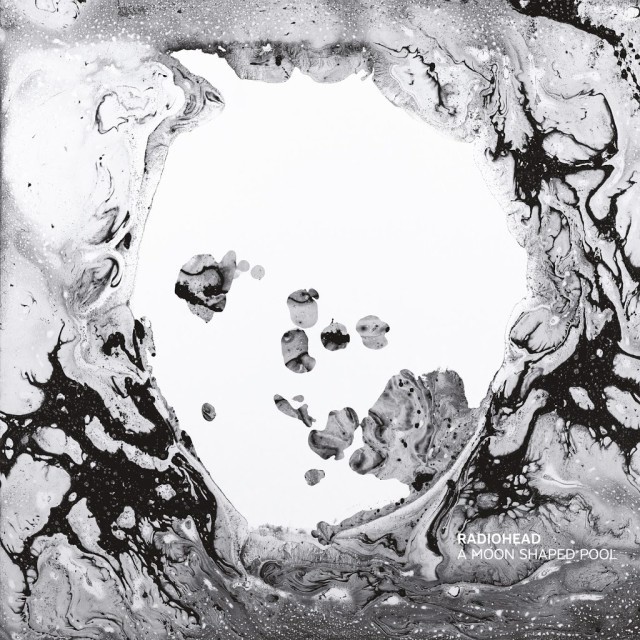There is a certain degree of futility in reviewing a new Radiohead album. Although the term is thrown around quite loosely, it could be convincingly argued that Radiohead are legitimately a ‘critic-proof’ band and nothing that a bespectacled, pseudo-musical aficionado can say will affect anyone’s views. There is a good possibility that everyone reading this has already secured, listened to and devised their own opinion of the disc and its relative merits and is simply reading this as a form of validation. So since the majority of you have already digested it, let’s get the obvious question out of the way: is A Moon Shaped Pool any good? The answer is, of course, yes, but exactly how good it is is entirely dependant on your own views as to when they peaked. Nestled deep within its just shy of an hour runtime is some of most emotionally frank work the group has ever produced and their emphasis on chamber pop and more baroque elements lends a humanity that has been absent from their output since Kid A. While at times, it does feel like the band is floating on autopilot, there is still enough intrigue, passion, and magic to ensure the record never feels like a chore.
What’s immediately striking about A Moon Shaped Pool is how it almost entirely bypasses the groundwork laid by 2010’s King of Limbs and instead opts to carry the torch they lit on 2007’s In Rainbows. No matter what way you look at it, KoL was an uneven and unsatisfying listen that flirted with greatness but never found any kind of cohesion, whereas In Rainbows had a self-assuredness that sealed its place in the upper echelons of the group’s back catalogue. By choosing this album as a framework, they have given themselves the freedom to play to their strengths and to create a new and exciting interpretation of their wheel.
As with every Radiohead album since OK Computer, there is some stylistic trait that the record can be, lazily, boiled down to. Here, orchestral and choral elements are the defining characteristic. Guitarist Jonny Greenwood is a composer in his own right and his control over an orchestra is demonstrated to a clear and undeniable effect. Lead single and opener ‘Burn The Witch’ is a great testament to this with its staccato, pounding strings, tapping with a militaristic precision that instantly puts the listener on the back foot, before seamless giving way to almost Bernard Hermann-esque breakdown that ratchets up the tension to breaking point. While the late performer ‘Tinker Tailor Soldier Sailor Rich Man Poor Man Beggar Thief’ fuses an electronic soundscape with soaring, bombastic strings in a way that evokes that same magic that made Scott Walker’s solo debut so magnificent. The orchestral components are melded together with these ethereal, disembodied cries that push the music into a hypnotic realm, managing to recapture the same allure of ‘Nude’ and ‘Videotape’. This is a trick they’ve played throughout their career, but seldom as well as they have here. Pieces such as ‘Daydreaming’ and ‘Decks Dark’ expand on this sonic palette, taking it to its logical endpoint and mining it for all that it is worth. There is something so riveting about listening to them weave such a fluid tapestry of the baroque with this much ease.
Radiohead has always been a guitar band. Whether they be crunch-crunch alt-rock of Pablo Honey, the otherworldliness of OK Computer or the flickers on Kid A, the group has always held those six strings close to the chest, even pushing the instrument to the point of recognisability. Here, what they’ve done is strip it back to the bare bones and let the guitar speak for itself in the form of these absolutely spellbinding numbers that calls to mind Richard Thompson or Bert Jansch or Roy Harper. ‘Desert Island Disk’, for example, is this absolutely sublime lilting English folk guitar that underscores the mastery that Ed O’Brien and Greenwood possess.
As is the case with the majority of the band’s more recent output, the real stars for much of the record are the dynamite rhythm section driven by Phil Selway and Colin Greenwood. The duo has this beautiful, intricately managed balance of technicality and emotion that gives the songs this almost impossibly smooth groove the induces dread and movement in equal measure. ‘Identikit’ is definitely one of the stronger cuts thanks to these but the real showstopper here is ‘Ful Stop’. It’s this ominous and foreboding slice of Aphex Twin techno that retains a glitchy, paranoid rhythm throughout the runtime, increasing in tension and power as it loops around again and again. It exemplifies everything that works about the duo’s interplay and highlights the sheer talent each member brings to the table.
It isn’t a faultless record, but it’s a difficult one to find fault with. As with some much of their oeuvre, it will best be judged by how it ages. The most apparent criticism that can be levelled against it is that, at times, it plays it too safe. ‘Burn The Witch’, while a great track, feels almost like a Coldplay song. Now it is probably the best song Coldplay have produced in a decade, but to write music that one of your direct disciples could have written is worrying. This feeling could come from the fact that many of the songs here have been demoed as far back as the mid-1990s, suggesting this is just a collection of trumped up B-Sides. But this reevaluation of forgotten cuts highlights something truly special: Radiohead are completely comfortable with their legacy. After trying to push forward in so many different directions on King of Limbs, introspection was exactly what the doctor ordered. By letting these unfinished songs gestate, they gave them this finely tuned and lovingly crafted sensibility. All of this leads to an overriding sense of spiritual frankness that runs throughout. ‘Glass Eyes’, this ‘Faust Arp’-like lament of crushing isolation of the city and emotional detachment, is a thing of beauty and, although it does tread well-trodden ground, Yorke’s lyrics are heartbreakingly profound. But the real shining beacon of the human condition is the album closer ‘True Love Waits’. The song, which has existed in a live form since The Bends and was previously released on ‘I Might Be Wrong’, is the perfect send off to the collection. Rich, heartfelt and incredibly poignant, it’s cripplingly powerful piano driven desperate plea for love that ends in a truly overpowering final line: “Just don’t leave/Don’t leave”. It is a culmination of so much of what the last three decades have been about: the desperate man reaching to the world for any sliver of connection.
What remains of A Moon Shaped Pool is the sheer scale and density of it. This is a sweeping, grandiose mini-epic that leaves a great deal to consider and explore; so much that rushing through it would be a fool’s errand. While everyone seems to be trying to get through it as fast as they can so as to be the coolest kid on the playground, you should take it slow and really enjoy it. As with every other record the band has released, there is serious magic buried within the disc that will come to life at its own pace; you can’t rush greatness. Will Murphy





